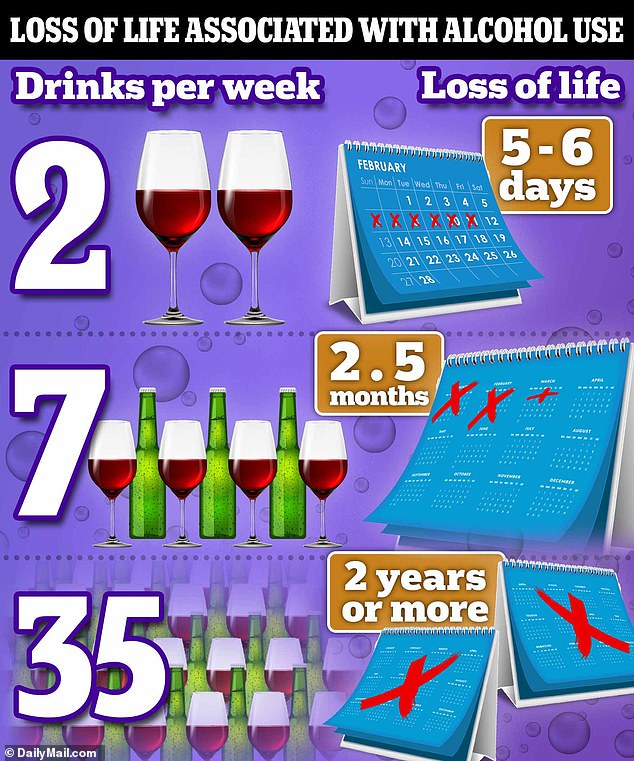Drinking a glass of wine or a bottle of beer a day was once considered ideal for health.
For years, studies suggested that you only need enough to get the anti-stress benefits and not enough to cause hangovers or other health risks associated with alcohol.
But a new report says these articles were based on “flawed” scientific research and the new consensus is that no amount of alcohol is safe.
He concludes that consuming one drink a day shortens a person’s life by two and a half months.
Consuming one drink a day reduces a person’s life by two and a half months (stock)
Lead researcher Dr Tim Stockwell, a scientist at the Canadian Institute on Substance Use Research at the University of Victoria, says studies linking moderate drinking to health benefits suffer from “fundamental” design flaws.
He notes that such studies have generally focused on older adults and have not taken into account people’s drinking habits throughout their lives.
Moderate drinkers were compared to groups of “abstainers” and “occasional drinkers” that included some older adults who had stopped drinking or reduced their consumption because they had developed various health problems.
Dr Stockwell said: “That makes people who continue to drink look much healthier by comparison.”
For the new analysis, Dr. Stockwell and his colleagues identified 107 published studies that followed people over time and looked at the relationship between drinking habits and life expectancy.
When the researchers combined all the data, it appeared that light to moderate drinkers (those who drank between one drink per week and two per day) had a 14 percent lower risk of dying during the study period compared with abstainers.
But things changed when the research team dug deeper.
They found that there were a handful of “higher quality” studies that included people who were relatively young to begin with (under 55, on average) and that made sure that occasional drinkers and former drinkers were not considered “abstainers.”
In those studies, moderate alcohol consumption was not associated with a longer life.
Instead, Dr Stockwell says it was the “lower quality” studies (with older participants, with no distinction between ex-drinkers and lifelong abstainers) that linked moderate drinking with greater longevity.
He said: “If you look at the weaker studies, that’s where you see the health benefits.”
Dr Stockwell says the idea that moderate drinking leads to a longer, healthier life goes back decades.

As an example, he pointed to the “French paradox” – the idea, popularized in the 1990s, that red wine helps explain why the French enjoy relatively low rates of heart disease, despite a high-fat diet.
Dr Stockwell says the view of alcohol as an “elixir” still appears to be “entrenched” in the public imagination.
In reality, he said, moderate drinking probably doesn’t prolong people’s lives and in fact carries some potential health risks, including an increased risk of certain types of cancer.
Dr. Stockwell said that’s why no major health organization has ever set a risk-free level of alcohol consumption.
He added: “There is simply no level of alcohol consumption that is completely ‘safe’.”
An average of just two drinks a week (bottles of beer, glasses of wine or a couple of shots of liquor) over a lifetime can shorten a person’s life by just three to six days, Dr. Stockwell said.
Consuming one drink a day shortens a person’s life by two and a half months.
Those who drink heavily (regularly drinking 35 drinks a week, about five a day, or two bottles of whiskey in seven days) shorten their life by about two years.
Last year, Ireland became the first country in the world to pass legislation that would require all alcohol producers to include a health warning on alcoholic beverage labels.
The official changes in health messaging reflect a sea change in how doctors and ordinary Americans view alcohol and how safe it is, based on major studies that debunk the myth that a little here and there is healthy.
According to the CDC, the average number of annual deaths due to excessive alcohol consumption — from direct causes like car accidents and liver damage to indirect causes like mental health problems or heart disease — rose about 29 percent, from nearly 138,000 in 2016 to 2017 to more than 178,000 in 2020 to 2021.
That’s more than the number of drug overdose deaths reported in 2022, which totaled approximately 108,000.
This may seem like a higher figure than expected, given Dr Stockwell’s relatively moderate conclusions about the impact of alcohol on life expectancy.
The labels will read: “There is a direct link between alcohol and deadly cancers.” The policy will come into effect in 2026.
Meanwhile, Canada recently proposed revised guidelines to recommend consuming no more than two alcoholic drinks per week, a drastic reduction from the previous limit of 15 drinks for men and 10 drinks for women.
And last year, President Biden’s health czar, Dr. George Koob, predicted that the USDA could revise its alcohol consumption advice to match Canada’s.

